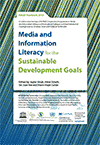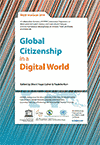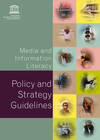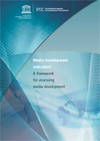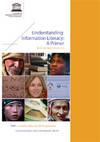Publications
List of UNESCO publications related to media and information literacy
Media and Information Literacy: Reinforcing Human Rights, Countering Radicalization and Extremism
As the world is witnessing an unprecedented increase of polarization, hate speech, radicalization and extremism happening both offline and online, MIL competencies are becoming increasingly important and a necessary response to help overcome disinformation, stereotypes and intolerance. This book is intended as a relevant reference point to initiate discussion and offer perspectives to stakeholders seeking to apply MIL as a tool to counter violent extremism.
>> Download
Opportunities for Media and Information Literacy in the Middle East and North Africa
This book was written as a resource for educators in the Middle East and North Africa region looking for opportunities to bring to their classrooms elements of MIL education, with the hope that it will facilitate the development of better understanding among individuals from different religious and cultural backgrounds.
>> Download
Media and Information Literacy for the Sustainable Development Goals
This yearbook is intended as a reference for all who are interested in promoting MIL across frontiers as tool for open and inclusive development, with over 31 articles dealing with education, sustainable development, and freedom of expression, interreligious and intercultural dialogue, media and other information providers, gender equality, persons with disabilities, linguistic diversity, environment, health and agriculture.
>> Download
Global Citizenship in a Digital World
The proliferation of mediated spaces throughout education, personal and professional environments does not in itself guarantee that citizens will consider their role as global citizens as they create and consume media. This awareness must be cultivated, encouraged and taught, which this publication seeks to do by offering new strategies and sharing research findings, best practices, musings as well as reflections.
>> Download
Media and Information Literacy and Intercultural Dialogue
The MILID Yearbook initiative is a collaborative effort between UNESCO and the UN Alliance of Civilizations (UNAOC), through their UNITWIN Cooperation Programme on Media and Information Literacy and Intercultural Dialogue (MILID), and NORDICOM’s International Clearinghouse on Children, Youth and Media. It seeks to stimulate fruitful intercultural dialogues on media and information literacy and contribute to new knowledge and research both across and within national borders.
>> Download
Guidelines for broadcasters on promoting user-generated content and media and information literacy
For the first time guidelines have been published on how broadcasters around the world can encourage audiences to produce better quality user-generated content and to improve media and information literacy. The new guidelines will also enable the public to become more media and information literate.
Mapping media education policies in the world: visions, programmes and challenges
This publication, produced jointly by UNESCO, the UN Alliance of Civilizations, the European Commission and Grupo Comunicar, offers a comprehensive and multidimensional approach to media education. It provides answers to key questions for media, communication and education professionals, researchers and policy makers.
Media and information literacy curriculum for teachers
This Media and Information Literacy Curriculum for Teachers is an important resource for Member States in their continuing work towards achieving the objectives of the Grünwald Declaration (1982), the Alexandria Declaration (2005) and the UNESCO Paris Agenda (2007) – all related to MIL.
Media and information literacy: policy and strategy guidelines
This comprehensive MIL Policy and Strategy Guidelines resource is the first of its kind to treat MIL as a composite concept, unifying information literacy and media literacy as well as considering the right to freedom of expression and access to information through ICTs. These guidelines offer a harmonized approach, which in turn enables all actors to articulate more sustained national MIL policies and strategies, describing both the process and content to be considered.
Media development indicators: a framework for assessing media development
This paper defines indicators of media development in line with the priority areas of the International Programme for the Development of Communication (IPDC): promotion of freedom of expression and media pluralism; development of community media; and human resource development (capacity building of media professionals and institutional capacity building).
Media education: a kit for teachers, students, parents and professionals
This Training Kit provides a complex and comprehensive view of media education, encompassing all media, old and new. It seeks new ways in which people can enhance their participation in the political and cultural life of the general community through the media. In particular, it promotes young people’s access to the media, while also increasing their critical appreciation of its activities. It has a sustainable development perspective and addresses some of the challenges of knowledge societies, especially the digital knowledge divide.
Towards information literacy indicators
This book provides a basic conceptual framework for measuring information literacy and is designed to serve as a reference to facilitate the elaboration of information literacy indicators.
Understanding information literacy: a primer
This publication is an easy-to-read, non-technical overview explaining what "information literacy" means, designed for busy public policy-makers, business executives, civil society administrators and practicing professionals.
>> More UNESCO publications on communication and information
Back to top


